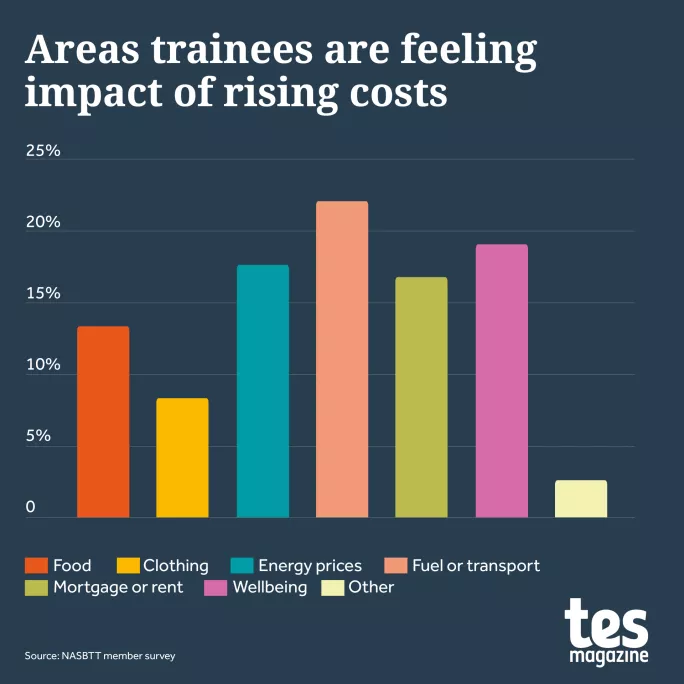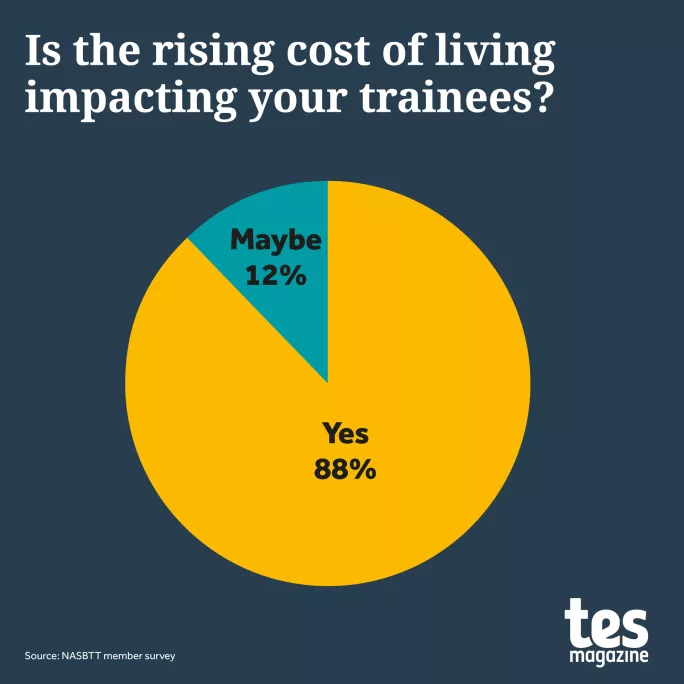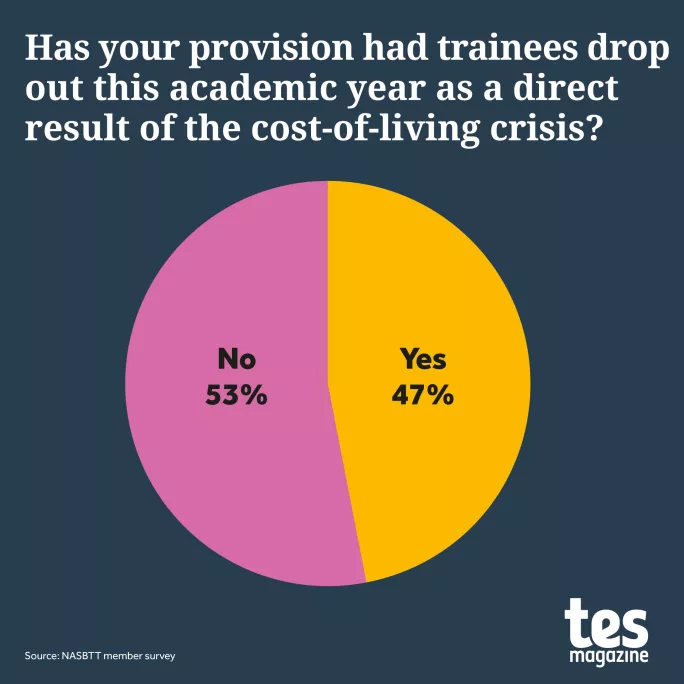Teacher trainee dropout warning amid costs crisis

Teacher shortages are set to become more acute amid the cost-of-living crisis as teacher trainees are forced to drop out of courses, school-based training providers have warned.
The vast majority of school-centred initial teacher training providers (SCITTs) are concerned that soaring costs will lead to trainee dropouts, according to a survey carried out by the National Association of School-Based Teacher Trainers (NASBTT) and seen by Tes.
Nearly half (49 per cent) of respondents said they were very concerned and a further 47 per cent said they were somewhat concerned that the cost-of-living crisis will lead to trainee dropouts.
And half of the 83 SCITT directors who responded to the survey reported they had already seen trainees drop out this academic year as a direct result of the costs crisis.
None of the respondents said the cost-of-living crisis and rising costs were not having an impact on their trainees.
Nearly nine in ten (88 per cent) said it was impacting students, and only 12 per cent said it was “maybe” affecting their trainees.
Providers said students’ ability to afford fuel and transport and energy prices were the biggest areas of concern, followed by the impact on their wellbeing.
Meanwhile, almost two-thirds (61.4 per cent) of providers who responded to the survey said the cost-of-living crisis is having an impact on their provision, such as operating costs, a decrease in funding available to schools and trainee dropouts, with 31.3 per cent describing the effect as significant.

Speaking to Tes ahead of the NASBTT conference this week, many providers also said that potential applicants are uncertain whether they will be able to afford to join future courses.
Trainees forced to take other jobs
The warnings from SCITTs have come despite the first Department for Education data for applications to courses starting in September 2023 showing they are 5 per cent higher compared to last year.
Experts say early data on applications, published yesterday, does not provide a reliable indication of what to expect on overall numbers of trainees as they can drop off over the ensuing months, leading to an overall number that is lower in comparison.
One SCITT director in the North East said their provider’s application figures for next year are already “fairly low”.
They said they’ve seen two trainees “drop out already”, with two working part-time jobs alongside a full-time course.
The director added that, as a smaller provider, they’re “very dependent” on a sufficient number of people applying for training so “we have enough money to actually pay staff and then obviously fund the training itself for the training teachers and pass on the payment to schools for the placement and so on”.
Treena Philpotts, director of Nottinghamshire Torch SCITT, is also seeing trainees having to work other jobs alongside their full-time teacher training courses.
She said that the sudden rise in costs means that current trainees’ budgets for their training year are “very different now to what they predicted it would be due to the cost-of-living crisis”.
“We do have trainees struggling, particularly those that don’t receive any bursary payments, as they try to manage with full-time training plus additional part-time jobs.”
- TeachVac: Teacher vacancy adverts hit record high
- Recruitment: Secondary teacher trainees 40% below government target
- Training: DfE raises teacher training bursaries amid recruitment crisis
She added they are doing “everything we can as a provider” in order to “support them with travel costs and some hardship funding”.
“What we don’t want to see is a dropout because of it. Training to teach is an investment year for many as they pay an additional year of course fees when they could seek alternative work routes.”
Ms Philpotts warned the pressure on trainees “may lead to a drop in available teachers in the workforce for next year, which would add further pressure on teacher shortages”.
She said: “Schools that are remote or not easily accessible via transport links may find it even more difficult to recruit teachers...as this now plays a greater part in the applicant decision making because they can no longer afford lengthy or difficult commutes.”
Missed targets
The most recent government figures show the pandemic boost to teacher trainee applications was short lived.
For this year’s intake, the DfE missed its target for secondary teacher trainee numbers by 40 per cent, according to its own data, with the number of secondary trainees accepted onto courses that started in September almost a quarter (23 per cent) below pre-pandemic levels.
The soaring costs crisis and funding squeeze on schools are also impacting the availability of training for students, warns the SCITT director in the North East.

They said they now have placement schools “pulling out of offering placements because they’re saying they’re cutting costs”.
They added that placements are needed for teachers to get the experience they need, “so it’s a vicious circle” as the availability of training opportunities impacts trainees’ ability to progress to qualification.
Another SCITT director said one student, who is having particular problems this year, is a computing trainee whose landlord put up the rent to the point where she couldn’t afford to continue living there.
“She was in bed and breakfast accommodation trying to still do the course.”
While she has now found other accommodation, the director says the trainee is having sleepless nights.
Concerns over a new crisis in the primary supply
There are also concerns that the situation for primary trainee intake could take a downward turn this year as the rising cost of living combined with a lack of bursary for primary trainees bites.
The number of primary trainees slightly exceeded the DfE target in the 2021 to 2022 academic year, with 11,939 placed on courses.
But NASBTT’s survey shows that this supply could also soon be under threat.
Many providers speaking to Tes, and adding comments in the NASBTT survey, said that the risk of trainee withdrawals was particularly an issue with primary trainees and for some secondary subjects without a bursary.

Stuart Russell, senior director of ITT at Kent and Medway Training, said the current bursary system for teacher trainees is “very very unfair”.
He said trainees doing courses without bursaries face “challenges that are very tough anyway in the best of times”.
But now, with the cost-of-living crisis adding to this burden, “it’s, unfortunately, making things even more challenging for the trainees and in some scenarios it’s making it impossible for those to continue,” he added.
Mr Russell said that while retention has been positive this year so far, finance has become an issue for the first time, alongside concerns over workload and wellbeing.
While KMT has always allocated a small budget to support trainees, they’ve been forced already this year to put up the training support budget, and they’re constantly amending it “because of the requests that are coming into us”.
“If we weren’t to offer this olive branch, they would have to leave,” he said.
Mr Russell warned that the budget is “not a bottomless pot of money” and, “ultimately, there is a limit to what we can do as a provider in terms of support”.
Kerensa Carrick, director of East SCITT, said she’s finding that potential applicants for the September 2023 intake are already being deterred from enrolling on the course.
“I’ve had a lot of conversations recently where people are saying they need to weigh up whether they can afford to do this.”
She said she is seeing “really strong candidates” who want to change careers and train as teachers but they can’t afford the pay cut against a backdrop of soaring costs.
“What I find really awful, actually, is that people who want to change careers, people who have a lot to offer to the teaching profession, from the point of view of diversity of experience, are unable to do so because they’ve got family commitments.
“And I think that there ought to be something in place to support those career-changing people who are precluded from entering because they can’t get a bursary.
“I think it’s really wrong.”
Mr Russell said he has already seen a fall in trainees that have made career changes this year.
He said his organisation has seen around a 16 per cent decrease in the number of trainees recruited to courses this year.

However, he said when he dove deeper into the data, it was just one area that had seen a 50 per cent reduction, which was West Kent, where they usually see ”a significant number of career changer” trainees.
He said he suspects that more flexibility in other areas of work means “those people are no longer necessarily wanting to change their career, because they can keep their large salary and do their job at home”.
He added that living in more expensive areas might be putting potential applicants off the move to avoid a pay cut.
“The decision several years ago to take away salaried funding for primary has had a devastating effect,” he said.
“We used to train 35 to 40 salaried primary trainees a year and, since that funding has been reduced, it’s now gone down to about five or six.”
He warns that primary trainees are “living on fresh air”.
“They have to take part-time jobs on weekends just to make ends meet.”
He explained that while this might be doable at the beginning of the training year, “as the bar gets raised and they’re teaching more, they don’t have time for that Saturday job”.
The DfE has been approached for comment.
You need a Tes subscription to read this article
Subscribe now to read this article and get other subscriber-only content:
- Unlimited access to all Tes magazine content
- Exclusive subscriber-only stories
- Award-winning email newsletters
Already a subscriber? Log in
You need a subscription to read this article
Subscribe now to read this article and get other subscriber-only content, including:
- Unlimited access to all Tes magazine content
- Exclusive subscriber-only stories
- Award-winning email newsletters
topics in this article



